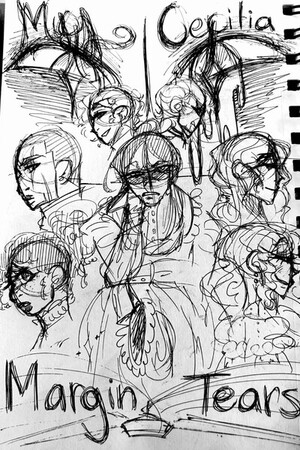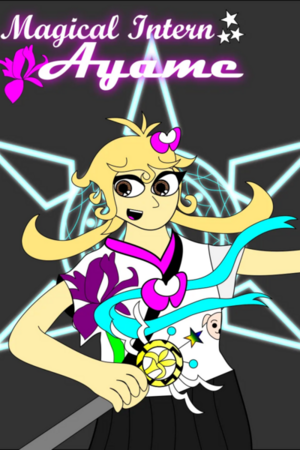Chapter 49:
Ending
Margin Tears: My Cecilia
Her head jerked upright.
The pen slipped from her fingers and tapped against the desk, rolling until it nudged her half-cold mug of coffee. She blinked, dazed, as the soft yellow pool of her desk lamp resolved the familiar shapes around her—Bookshelves stacked with their orderly spines, the comfortable clutter of paper and ink, the muffled tick of the clock on the wall.
She was home. She was back. She was safe.
She had to be
For a long moment she simply sat there, her breath uneven, waiting for the hush to break into echoing footsteps, for velvet draperies to ripple in a phantom drift, for his voice to murmur her given name. But none of it came; there was only the steady silence of her office, so normal that it felt foreign.
Her hand drifted to her chest. The fear lingered like a bruise—she half-expected to feel his presence still pressed against her, the relentless pull of his devotion. But there was only the quick hammering of her own pulse.
For a long moment she sat in the chair, trembling, the hush of the library settling around her like a soothing balm. It smelled of dust and ink and the faint sweetness of binding glue,--No trace of iron and roses.
It almost made her ask—Was it a dream?
She choked on a laugh, short and cynical. God, the question felt nostalgic.
She exhaled shakily, head rested heavily in her hands. Relief trembled through her, but it wasn’t pure.
She missed them.
The five of them, her companions and confidantes, friends she had been afraid to call as such. They had been trapped in their own roles, their fates predetermined beyond their own actions. Perhaps they were not even the only ones. Maybe if she had stayed longer, tried harder, looked more closely, she could have found others.
And she had left them there, their very beings unthreaded at another’s whim, their lives made example to punish her.
Her throat tightened, fingers harshly tugged at a lock of hair. It felt like betrayal, even if she had never belonged to their world.
Her gaze fell to the journal on her desk, its jaded cover cracked and weathered, alluringly so. It laid dormant, its pages empty yet heavy with secrets and memories. She had also pulled a few hair ties and thick rubber bands around its body. Call her silly, call her paranoid, but the small bonds that kept the physical corpus of the book closed tight brought her mind a modicum of ease. Lastly, the final act of victory, she had pierced the cover’s leather spread with Coriander’s safety pin, maneuvering it so it laid over the four-sided star.
The quiet ache peeled further open inside her, mourning what could never follow her back. And that pain curdled when she thought of him, the one who would not let her go. The memory of his gaze—whoever he really was—clung to her like cobweb, threaded with promises spoken too softly, too insistently. In his absence, she felt both reprieve and doubt, suspicion that like he said, somewhere just beyond her periphery, out of sight but never out of mind, he was there, waiting.
She rose, letting her legs carry her forward, toward the open world, toward sunlight and sky, toward life unshaped by anyone but herself.
…
The afternoon air was cool and ordinary. Sunlight spilled across the quiet street, birds called from unseen perches, and the smell of dew and grass filled her lungs. For a long moment, she simply stood, letting the wind brush her hair and the world press in around her, tangible and stable.
Unaltered.
She had survived the lord’s dominion, the narrator’s tyranny, the collapsing story—And in the end, she stepped out of the nightmare with her mind, her body, and her spirit intact. She felt it; inside of her, she had irrevocably changed. There was a new sharpness to her thoughts, a quiet patience, a confidence borne of seeing impossible things and taking them into her own hands.
She looked up toward the sky, her chest fluttering from the shivering memory of tearing the seam in reality, and she allowed herself the faintest bittersweet smile.
The ordinary world was hers now, yes—but it was not naive. Every crack in a floorboard, every wavering shadow, reminded her that the extraordinary had touched her, and that she had learned to endure, to resist, and to bend even the impossible to her will.
She did not know if recovery was possible after facing such a tyrant, after seeing all that is considered fact and comfort be twisted and wrested from her grasp, held hostage. Perhaps a part of her, though, did not want to forget it. She had faced the author of worlds and stepped through the fracture into her own—the same, but new.
She took her first deliberate step forward, the soles of her tennis shoes crunching on gravel. Every step was real, every breath her own. The ordinary world felt sharper, richer, more vivid than ever before. And for the first time in a long time—since the Sisyphus Manor and before—she walked entirely for herself.
The book remained in her bag, closed but alive, its breathing shallow but present, a pulse buried deep under the spine and into its nerves. She did not yet know what she would do with such access to knowledge and power, or what new challenges might come, but she understood one undeniable truth—She was no longer a character in anyone else’s story.
She was free, and her world moved onward, with a million stories moving in sync.




Please sign in to leave a comment.